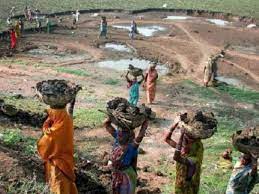A new directive from the union government now threatens to jeopardise the scheme’s implementation in the state.
Soon after the state raised a protest flag against the Bharatiya Janata Party-led Centre’s misinformation campaign alleging diversion of Mahatma Gandhi National Rural Employment Guarantee Scheme (MGNREGS) funds in Telangana, the union government issued a new directive that threatens to halt the scheme’s implementation in the state.
The new directive, issued late last month by the union Ministry of Rural Development and effective January 1, makes digital attendance capture mandatory for workers employed under the MGNREGS. The move, which the Centre touts as an attempt to combat corruption and irregularities, appears to have numerous flaws, including field supervisors lacking smartphones and a lack of technical or logistical support and internet connectivity.
Except for ‘individual beneficiary schemes/projects,’ the Centre’s directive requires all work sites to register attendance on a mobile app, the National Mobile Monitoring System (NMMS), regardless of the number of workers engaged. This necessitates twice-daily uploading of time-stamped and geo-tagged photographs of workers.
On May 16, last year, the Centre launched a pilot project for this, citing issues such as corruption, accountability, and duplication in muster rolls. Despite several issues, including technical glitches, the Centre decided to proceed with extending the NMMS for implementation across the country without addressing the issues.
Telangana has been among the states with the highest number of working days per person since the state’s inception. In terms of person days generated between April and September of this year, Telangana generated 9.92 crore in the six-month period. Officials are concerned that the latest directive from the Centre will reduce overall person days.
“We have flagged several technical and sociological issues pertaining to the app usage. We are concerned that it will discourage workers from participating in MGNREGS projects, affecting their implementation in the state,” a Rural Development department official told
Officials plan to take geo-tagged and time-stamped photographs of workers twice a day at the worksite to check for forged attendance on muster rolls. Workers must, however, remain on the job site until they are photographed. During the pilot project, poor internet connectivity and technical errors repeatedly hampered online attendance capture.
Furthermore, officials are required to match hundreds of photos of workers taken at work sites with those on their job cards on a daily basis, which is described as nearly impossible. Workers are also being forced to work for a set number of hours, which contradicts the original goal of the MGNREG Act, which allows workers to be paid on a piece rate basis rather than a time rate basis.
Several organisations, including People’s Action for Employment Guarantee (PAEG), which has advocated for MGNREGA since 2004, have expressed concern about the Centre’s decision, claiming that it will not eliminate corruption and will instead discourage workers from seeking employment.
To make matters worse, the app is entirely in English, and there is no technical support available to help users resolve a variety of issues. In the event of a technical failure, workers have no choice but to leave because attendance cannot be recorded.
The MGNREGS in Telangana has recently been in the news, with the union government serving a notice to the state government late last year to return Rs.151.9 crore in MGNREGS funds spent on drying platforms under the scheme, claiming that they were not permitted under the Central scheme guidelines. The state had called the Centre’s action vengeful, especially since the Centre had previously allowed states with coastal lines to build fish drying platforms under the same scheme.







